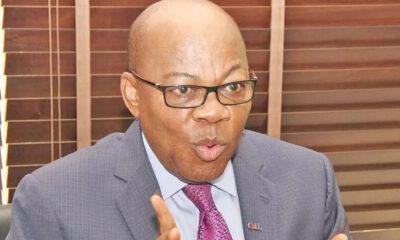Business
Stolen N1.5bn pension funds found in Maina’s Account, says witness

The trial in absentia of Abdulrasheed Maina, former Chairman, Pension Reform Task Force Team, continued on Wednesday, with a startling revelation by a witness that N1.5bn of the pension funds was found in the account of the ex-PRTFT boss.
The witness also told Justice Okong Abang of the Federal High Court, Abuja during the trial how N14 billion pension money was pilfered under Maina.
The Economic and Financial Crimes Commission, EFCC is prosecuting Maina, alongside his firm, Common Input Property and Investment Ltd.
Both are facing a 12-count charge of operating fictitious bank accounts, corruption, and money laundering to the tune of N2 billion.
At the trial, counsel to Common Input Property and Investment Ltd (the second defendant), Adeola Adedipe told the court of his intention to disengage as the company’s counsel.
Though Prosecution counsel, M.S. Abubakar, acknowledged the receipt of the defence counsel’s disengagement application, dated November 25, 2020, and made no objection to it, Justice Abang, ruled that Adedipe should remain counsel to the second defendant by the court records.
The testimonies against Maina continued with that of the ninth prosecution witness, (PW9), Rouqayyah Ibrahim, a principal investigation officer with the EFCC in Anti Money Laundering and Combating Terrorism Financing (AML CFT) unit of the Commission and member, Pension Fraud Team.
He stated that he knew Maina and Input Property Investment Ltd, following the invitation of the EFCC in 2010, to join in the pension verification exercise.
According to him, a payment mandate, bearing the names of several individuals, totalling N94 million was discovered during the course of the verification.
He said some of the pensioners’ names on the list were fake, for which a report was made to the EFCC by the team, leading eventually to the creation of the Pension Fraud Team.
The Pension Fraud Team, he said, wrote to about 30 banks, requesting the bank accounts of Mr. Steven Oransanye as the Head of Service.
It turned out that Oransanye at that time, operated 66 illegal bank accounts, unknown to the Accountant General.
“Our investigation revealed that there were five modus operandi that the suspect whom we were investigating at that time was using to steal money from the pension account.
“In total, we were able to deduce that N14 billion was stolen from the pension account.
“The five modus operandi were payment to fake pensioners, non-existing contracts, illegal payment to National Union of Pension NUP and illegal payment to another association called Association of Retired Federal Civil Servants.
“We discovered that the suspect will often pay companies for non-existing biometric contract and once the payment is made, they withdraw cash and hand it over and likewise payment to the two associations of NUP and Association of Retired Federal Civil Servants.
“They will withdraw the money cash and hand it over to the person who asked them to supply the account.
“Once we concluded the investigation of those who were indicted, they were charged to court, and some have been convicted,” the witness said.
He said Abdulrasheed Maina was part of those indicted and charged before Justice I. Ekwo of the Federal High Court, Abuja, but that he ran away for six years. And was arrested and charged before the present court.
The PW9 revealed that Maina as chairman, PRTT was deeply involved in stealing pension funds. One of the things discovered was the payment of N133 million for a non-existing contract to Xanjhi Technology, a company he appointed to computerize the pension payroll.
The money was withdrawn in cash, converted to dollars and handed over to Khalid Biu (PW5), a staff of Fidelity Bank and handed over to Maina’s secretary, Ann Igwe Oluchi, who is now standing trial at FCT High Court Gwagwalada.
Xanjhi Technology and its owner, Ahmed Mazangari are also standing trial for inserting about 15 fake persons into the pension payroll which they were engaged to computerize.
Said the witness, “We also discovered that Frederick Hamilton Ltd, owned by Osa Afe, presently standing trial with Steven Oransanye who received payment for a non-existing biometric contract handed over about N250 million to Maina.
“Our investigation further revealed the existence of six accounts with Fidelity Bank. Out of the six, five were linked to Abdurrasheed Maina.
“We discovered that there was nowhere in the accounts opening packages of these accounts where the name, birthday or signatures of Abdurrasheed Maina appeared.
“These account are: Nafisatu Aliyu Yeldu (PW4) Drew Construction, also an account Kangolo Dynamic Cleaning Services Ltd, Cluster Logistics Ltd, Fatima Aliyu. He also had a personal account in his own name with Fidelity Bank, and also in the name of Dr. Abdullahi Faizal.
“For example Nafisatu Aliyu Yeldu’s account bears the name of Abdurrasheed Maina’s sister. It also bears her passport photograph.
“On the face of it, it appears the account belonged to her, but when we invited her for investigation, we discovered she didn’t know anything about the account, even though it contains her name and children but it was not her signature.
“She informed us that she remembers at one point that Toyin Meseke (PW2), who is a Fidelity Bank staff requested for her PHCN (power utility) bill but she wasn’t sure what he wanted it for and that was one of the documents that was used in opening the account.
“She also informed us that when she started receiving alerts, she contacted Toyin Meseke and he promised to deal with the issue.”
“The turnover in Yeldu’s account, the witness said, was over N300m.
“The analysis of the identity used in the opening of Abdullahi Faizal’s account, (one of the many variants of the name Maina used for his son and himself) showed that it was forged, even as Meseke, the account officer, confirmed that Maina had complete control over the account, though his name, signature and photograph did not appear anywhere in the account opening packages. The account had a turnover of about N1.5 billion within nine months from mostly cash deposits from unknown sources.
“We called for the statement of Drew Construction and of his Fidelity Bank, and discovered the same modus by Maina, concealing and stealing the identity of his family members, registering companies in their names, opening corporate bank account without their knowledge.
“In the case of Drew Construction, it was the name of his other sister, Fatima Abdullahi Aliyu. When she was confronted, it showed that she had no knowledge of the account, even though it bore her name and other similar information that belonged to her. The turnover was about N55 million all from cash deposits within a few months.
“We also discovered from Common Input, a company registered by Maina and his wife, using the details of his sister (PW2), taking advantage of his sister-in-law, Mairo Bashir (PW1), who deliberately allowed Maina to conceal his identity without doing the ‘Know Your Customer’ and allowing him to operate the accounts as Fatima Abdullahi. When Fatima was invited, we confronted her that her BVN was linked to Common Input and Kongolo Dynamic Cleaning Services Ltd and she confirmed that she did not know about the existence of the company and that Maina requested her to give her BVN so that she will be removed as a signatory from the company and she wasn’t aware of being a signatory of any company but innocently gave them the BVN, believing that will make her stop being a signatory of the said company.
Justice Abang adjourned the trial till December 3, 2020.
Auto
Carloha announces Chery SUV gift for NAPE Charity Golf Tournament winner

Carloha announces Chery SUV gift for NAPE Charity Golf Tournament winner
Ultimate winner of the forthcoming NAPE Charity Golf Tournament holding in Abuja will drive home Chery Tiggo 8 Pro, a superlative sport utility vehicle.
Carloha Nigeria, one of the major sponsors of the event, disclosed this in a statement issued in Lagos.
The golf tournament is scheduled to take place at the prestigious IBB Golf & Country Club, Abuja, on October 26, 2024.
Carloha, franchise holder and assembler of Chery vehicles in Nigeria, said its sponsorship of the tournament was part of its commitment to fostering sports development in the country.
Part of the statement read, “Chery is offering its flagship SUV, the Tiggo 8 Pro as the ultimate prize for any player who achieves a hole-in-one during the tournament.
“This event promises to be an unforgettable experience for golf enthusiasts and those passionate about positively impacting our community.”
It specifically noted that the highlight of the tournament would be the incredible hole-in-one winning feat attracting a prize of Chery Tiggo 8 Pro generously provided by Carloha without insurance premium coverage for the tournament.
This prize is said to underscore Chery’s support for sporting initiatives in Nigeria and reflect the brand’s passion for nurturing talent and promoting community engagement through sports.
Director of Sales for Carloha Nigeria, Mr. Joseph Omokhapue, said, “We are glad to be one of the major partners in the NAPE Charity Golf Tournament, and offering an amazing prize for the hole-in-one with Tiggo 8 Pro represents Chery’s dedication to supporting sports in Nigeria, as well as enhancing the excitement and competitiveness of the tournament, making it an event to remember.
“More importantly, this gesture is one of the many ways Carloha is contributing to the underprivileged in our society by associating with the NAPE Charity Golf Tournament.”
By participating in this prestigious event, Golfers have the chance to showcase their skills and also contribute to a worthy cause.
Proceeds from the tournament would go towards supporting local charities, creating a lasting impact on the lives of those in need, the statement added.
The Tiggo 8 Pro, according to the firm, is renowned for its luxury, cutting-edge technology, stylish design, dynamic performance, and it perfectly embodies Chery’s dedication to excellence for on and off-road experience.
The Tiggo 8 Pro features an elegant, high-tech electronic gearshift system that provides effortless and precise control, enhancing safety performance and ease of operation, adeptly tailored for the diverse terrains of Nigeria.
It urged golfers and sports enthusiasts to get ready to swing for success at the NAPE Charity Golf Tournament.
“We look forward to seeing you at the IBB Golf Country Club as we come together to make a difference, promote sports development in Nigeria, and celebrate the Chery brand,” it stated.
As part of its commitment to make vehicle ownership easy and affordable for all, Carloha Nigeria offers a remarkable 6-year warranty/200,000 kilometers, 6-year free service on all Chery vehicles, a flexible auto financing solution with the best price for all vehicles, and 24/7 services and parts support nationwide.
This ensures that owners can enjoy their Tiggo 8 Pro with confidence, knowing they have reliable support and service from Chery for years to come.
Auto
NNPC to establish 40 new CNG stations nationwide

NNPC to establish 40 new CNG stations nationwide
The Nigerian National Petroleum Company (NNPC) has acquired equipment to establish 40 new Compressed Natural Gas (CNG) stations across the country, as part of efforts to expand CNG infrastructure.
This comes as the Federal Government aims to set up 100 CNG stations within six months.
Oluwagbemi Michael, Director of the Presidential CNG Initiative, revealed the plans during an event in Ogun State.
He noted that 12 CNG stations were set up in the past year, six in Abuja and six in Lagos, with further expansion underway.
READ ALSO:
- No more application fees for Lagos scholarship, bursary – Sanwo-Olu
- Lagos seals 352 churches, mosques, others for pollution
- Israel confirms killing Safieddine, likely successor to slain Hezbollah’s Nasrallah
This move follows concerns over the limited availability of CNG stations, which has slowed the adoption of CNG as an alternative to petrol.
Michael highlighted ongoing investments in infrastructure, including a recent N122bn funding for private companies involved in CNG distribution.
He also mentioned the government’s plan to distribute one million CNG conversion kits to commercial drivers, which is expected to increase demand and attract more investors to the sector.
Additionally, existing petrol stations are being upgraded to include CNG refuelling points, with 40 such upgrades planned by the NNPC.
NNPC to establish 40 new CNG stations nationwide
Business
MTN threatens to shut down services without tariff hike

MTN threatens to shut down services without tariff hike
MTN Nigeria has warned of a potential shutdown if tariffs are not increased to address the rising operational costs that are threatening the profitability of the telecommunications sector.
During a tour of MTN’s facilities in Ibeju-Lekki, Lagos, MTN’s CEO, Karl Toriola, said the telecom sector has been facing significant financial losses and urgent measures are needed to reverse the trend.
Toriola pointed out that MTN, which currently has around 78 million subscribers, is operating on reserves accumulated over the past two decades, a situation he described as unsustainable.
READ ALSO:
- Air Force mourns death of 5 personnel in Plateau road crash
- VeryDarkMan wants Portable arrested over viral assault video
- Vinicius Jr will win Ballon d’Or, says Ancelotti
The company’s operating costs, especially diesel prices needed to power its base transceiver stations, have surged, adding pressure to its financial performance, he added.
The CEO stressed the importance of returning the telecom industry to profitability, warning that without a tariff hike, MTN might be forced to shut down operations.
“There should be no delusion; if the tariff doesn’t go up, we will shut down,” he said.
He noted that MTN, once one of the largest corporate taxpayers in Nigeria, has seen a decline in its tax contributions due to the financial challenges the sector is facing.
MTN threatens to shut down services without tariff hike
-

 News2 days ago
News2 days agoFIRS announces recruitment of young graduates
-

 metro3 days ago
metro3 days agoUpdated: Army says reports of COAS Lagbaja’s death fake news
-

 metro2 days ago
metro2 days agoOluwo chased me out when I visited him – Ooni (VIDEO)
-

 News2 days ago
News2 days agoOsinbajo traitor, can’t talk about integrity – Reno Omokri
-

 metro2 days ago
metro2 days agoFani-Kayode: How my aide died in hotel after attending church
-

 Business1 day ago
Business1 day agoWe’re settling out of court with NNPC, others — Dangote
-

 metro2 days ago
metro2 days agoBREAKING : DSS replaces Tinubu’s chief security officer
-

 News2 days ago
News2 days agoYou can’t overrule Supreme Court on LG autonomy – Klinsmann tells Soludo














You must be logged in to post a comment Login